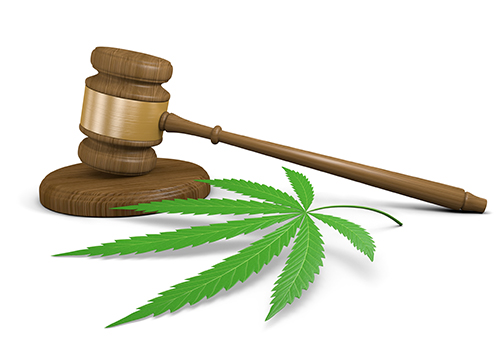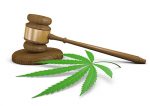Regulatory Oversight and Emerging Enforcement
Even though hemp-derived CBD is now legal under federal law, the production, distribution, transportation, sale and use of hemp-derived products is heavily regulated. The USDA has original jurisdiction over implementation of the 2018 Farm Bill; as part of that legislation, USDA is responsible for promulgating regulations relating to the production and commercialization of legalized hemp and hemp products, including hemp CBD.
In addition to USDA, several other federal agencies have responsibilities relating to the regulation of CBD products. For example, the federal agencies that regulate the distribution and advertising of consumer products, such as the FDA. In passing the 2018 Farm Bill legislation, Congress explicitly preserved the FDA’s existing authority to regulate consumer products containing cannabis or cannabis-derived compounds under the Federal Food, Drug, and Cosmetic Act (FD&C Act) and section 351 of the Public Health Service Act. Scott Gottlieb, M.D. the FDA Commissioner at the time of the 2018 Farm Bill’s passage, issued an official statement confirming the agency’s responsibility to oversee and regulate hemp and hemp CBD products to protect public health and safety.
“Today, the Agriculture Improvement Act of 2018 was signed into law. Among other things, this new law changes certain federal authorities relating to the production and marketing of hemp, defined as cannabis (Cannabis sativa L.), and derivatives of cannabis with extremely low (less than 0.3 percent on a dry weight basis) concentrations of the psychoactive compound delta-9-tetrahydrocannabinol (THC). These changes include removing hemp from the Controlled Substances Act, which means that it will no longer be an illegal substance under federal law.
Just as important for the FDA and our commitment to protect and promote the public health is what the law didn’t change: Congress explicitly preserved the agency’s current authority to regulate products containing cannabis or cannabis-derived compounds under the Federal Food, Drug, and Cosmetic Act (FD&C Act) and section 351 of the Public Health Service Act. In doing so, Congress recognized the agency’s important public health role with respect to all the products it regulates. This allows the FDA to continue enforcing the law to protect patients and the public while also providing potential regulatory pathways for products containing cannabis and cannabis-derived compounds. . .
In short, we treat products containing cannabis or cannabis-derived compounds as we do any other FDA-regulated products — meaning they’re subject to the same authorities and requirements as FDA-regulated products containing any other substance. This is true regardless of the source of the substance, including whether the substance is derived from a plant that is classified as hemp under the Agriculture Improvement Act.” – Scott Gottlieb, M.D., former FDA commissioner
In addition to the FDA, the FTC also regulates CBD products based on the manner in which they are marketed to the public. For example, it is unlawful under the Federal Trade Commission (FTC) Act (15 U.S.C. § 41 et seq.) to advertise that a product can prevent, treat or cure human disease unless the seller possess competent and reliable scientific evidence, including, when appropriate, well-controlled human clinical studies, substantiating that the claims are true at the time they are made. Likewise, the agency has taken the position that making or exaggerating such claims, whether directly or indirectly, through the use of a product name, website name, metatags, or other means, without rigorous scientific evidence sufficient to substantiate the claims, violates the FTC Act.
Learn more about the direction of the cannabis industry at the 2019 Cannabis Quality Conference & Expo, which is co-located with the Food Safety Consortium Conference & Expo | October 1–3, 2019 | Schaumburg, ILWith these regulatory responsibilities in place, both the FDA and the FTC have begun taking action to regulate irresponsible behaviors in the CBD marketplace. FDA’s concerns focus on the as-yet unproven safety of such products, while the FTC’s focus is on misleading or fraudulent marketing of the products’ benefits. The FDA has restrictions in place advising that CBD cannot be introduced into commercialized foods and beverages without the appropriate additive approvals required under the FD&C Act.
Both the FDA and the FTC have issued warning letters to companies making CBD products regarding misleading or unsubstantiated marketing statements. For example, the FDA and FTC have issued joint warning letters to Nutra Pure LLC, PotNetwork Holdings, Inc. and Advanced Spine and Pain, LLC (d/b/a Relievus) asserting that commercialization of their respective CBD products as either drugs or dietary supplements violated the FD&C Act, while the FTC alleged that the advertised products may violate the FTC Act by making false or unsubstantiated health claims.
Additionally, the FDA recently sent a warning letter to Curaleaf, allegedly the most valuable cannabis company in the United States, due to Curaleaf’s advertisements related to various CBD products, including pain-relief lotions, patches, tinctures and vape pens. The warning letter stated that those CBD products constituted unapproved new drugs, misbranded drugs and improper dietary supplement labeling.
Despite these enforcement efforts, many observers express concern over the “Wild West” nature of the developing CBD marketplace. Aggressive entrepreneurialism and open markets may be good incubators for a nascent industry, but the lack of consumer protections such as uniform standards, reliable testing and informative labeling can lead to material risks.
Signs of Progress on Federal Compliance Guidance and Needed Research
Better consumer protections, along with the ongoing dichotomy between federal and state drug policies, have heightened the need for definitive regulatory enforcement policies and compliance guidance. Cannabis industry members generally, and CBD marketers in particular, hunger for clear guideposts on what is and is not legal.
Although such guidance has been slow in coming, several recent developments suggest the federal government finally has recognized that the industry is only going to grow. As a result, different agencies are beginning to show proactive movement towards normalizing the commercialization of CBD and cannabis.
USDA. On May 28, 2019, the USDA took the extraordinary step of issuing a “Legal Opinion on Authorities for Hemp Production.” A response to passage of the 2018 Farm Bill, the USDA’s legal opinion formally acknowledged that the 2018 Farm Bill authorized the production of hemp and removed hemp and hemp seeds from the DEA schedule of Controlled Substances. Beyond that, the USDA’s Office of the General Counsel (OGC) went on to conclude the following:
1. “After USDA publishes regulations implementing the new hemp production provisions of the 2018 Farm Bill, States and Indian tribes may not prohibit the interstate transportation or shipment of hemp lawfully produced under a State or Tribal plan or under a license issued under the USDA plan.
2. States and Indian tribes also may not prohibit the interstate transportation or shipment of hemp lawfully produced under the 2014 Farm Bill.
3. A person with a State or Federal felony conviction relating to a controlled substance is subject to a 10-year ineligibility restriction on producing hemp under the Agricultural Marketing Act of 1946. An exception applies to a person who was lawfully growing hemp under the 2014 Farm Bill before December 20, 2018, and whose conviction also occurred before that date”.
FDA. A few days later, the FDA held a public hearing on May 31, 2019, for cannabis industry stakeholders to share their experiences and challenges with products containing cannabis and cannabis-derived compounds, including CBD. Despite its jurisdiction over the nation’s food and drug supplies, the FDA does not yet have guidelines for approving CBD products, much less addressing issues relating to safety, standardized dosage amounts, testing and labeling. Regulation and oversight is mostly left to manufacturers and sellers, which means consumers cannot be sure that they are getting what a product label says. However, the federal government is beginning to make progress towards meeting the industry’s demands for guidance and research.
The FDA’s May 31, 2019 public hearing elicited information and views related to the safety of such products, as well as input relevant to the agency’s regulatory strategy related to existing products. Industry stakeholders focused on five key goals:
- Acknowledgment of the industry’s potential economic impact
- Expedited promulgation of cannabis and CBD regulations
- Agency confirmation that CBD products are GRAS, or generally recognized as safe
- Acceptance of voluntary, consensus-based product standards
- Streamlined guidelines on requirements for informing consumers of any potential risks.
Advocacy organizations representing patients also spoke at the hearing. Most of their comments focused on the desire for clear warning labels, testing standards, and more clinical trials and more studies to validate or rebut claims associated with the effects of cannabis and CBD.
State regulators speaking at the FDA’s hearing also emphasized the need for greater research and scientific study of cannabis and CBD. State representatives complained that states are struggling with the lack of sound scientific research available that addresses CBD and long-term health impacts, even as their markets have grown exponentially.
The primary request from all who attended the FDA’s May 31 hearing focused on the need for more data. Researchers and healthcare providers want to study the efficacy of CBD used in medicine; regulators want public safety information; patient advocates want to see data about effects on at-risk populations; trade organizations want data to back up label claims; and consumer groups, state policy makers, and law enforcement officials all want to understand just how safe and effective CBD is.
As part of that hearing, FDA opened a docket for public comments, all of which are accessible online.
DEA. Perhaps in response to the input received by the FDA at its May 31 hearing, on August 26, 2019, the DEA reaffirmed its plans to expand cannabis research and confirmed that certain products containing CBD are now legal. For more than half a century, there was only one federally approved cannabis grower: The University of Mississippi. It has had an exclusive status to be the federal government’s sole cannabis supplier for more than 50 years. However, with the recent explosion in cannabis products and legalization by a majority of states, federally funded researchers have been applying for more cannabis products than Ole Miss can supply.
In its August 26 press release, the DEA stated that it is moving forward to facilitate and expand scientific and medical research for marijuana. In the announcement, DEA Acting Administrator Uttam Dhillon said specifically:
“DEA is making progress in the program to register additional marijuana growers for federally authorized research and will work with other relevant federal agencies to expedite the necessary next steps. We support additional research into marijuana and its components, and we believe registering more growers will result in researchers having access to a wider variety for study.”
Nevertheless, before the agency will approve any of the applications, it wants to promulgate new rules to evaluate and oversee any potential new growers. As noted in the DEA’s August 26 press release: “The new rules will help ensure DEA can evaluate the applications under the applicable legal standard and conform the program to relevant laws.” When the DEA will give any applicant approval to cultivate remains unclear. In the meantime, the DEA took the opportunity to point out that hemp plants and hemp CBD preparations at or below the 0.3 percent delta-9 THC threshold, are no longer controlled substances, and a DEA registration is not required to produce or research such products.
The Bottom Line
As previously noted, the Agriculture Improvement Act of 2018 changed the federal definition of cannabis to exclude hemp. Although it is a strain of cannabis that contains CBD, hemp has very low levels of the psychoactive cannabinoid THC—the substance that gives cannabis-users a “high.” As such, hemp and hemp-derived CBD preparations that have 0.3% THC or less are not controlled substances and no longer require DEA registration. So, one thing is clear: Hemp CBD is no longer a proscribed product in America.
That said, the road forward still requires more guideposts. Although recent pronouncements from federal government agencies like FDA and DEA are helpful, any manufacturers making health claims about the CBD-containing products will still receive scrutiny from the FDA and the FTC. Any food or beverage producers or retailers adding CBD to their products do so at their legal peril, absent FDA review and approval.
In the absence of federal regulatory guidelines, responsible CBD retailers face a difficult challenge. For example, CBD products put physicians in a difficult position relative to patients who are requesting the products based on popular advertisements and word-of-mouth notoriety. More and more patients are eager to access CBD, even though there are many questions about dosage, drug interactions, potential organ damage and unregulated manufacturing standards. On top of these concerns, the lack of substantive clinical research into CBD means that the public has little to no information on long-term and short-term effects.
Moreover, for certain population demographics, such as children and pregnant women, the risks of adverse effects are reportedly significant. While CBD research likely will increase now that federal regulations on hemp have been relaxed, it nevertheless will take years before enough data are collected and properly analyzed to support substantive and effective federal regulations.
And finally, there is the ongoing tension between federal versus state law. As noted above, 33 states plus the District of Columbia have legalized cannabis to some degree. Yet 17 states have not, creating industry and consumer confusion over what is legal where. As long as federal and state laws are at odds with one another over the legality of cannabis, market confusion will remain.








As a small business owner in the CBD space we would love for the Feds to come out with clear regulations and guidelines. We believe it will help clean up a lot of the bad actors in the space and help legitimize the quality products that are available.